Commissioners of Yukon 1898 to 1918
The position of Commissioner of Yukon was created to preside over Yukon, now a separate territory from the Northwest Territories.
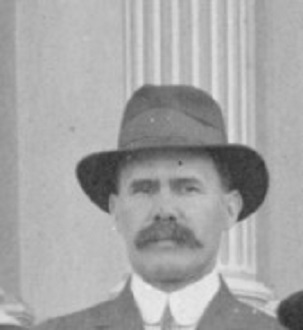 George Norris Williams
George Norris Williams

Administrator from October 13, 1916 to April 1, 1918 (appointed at the age of 50)
George Norris Williams was born on September 28, 1866 in Okaihua, New Zealand. He was a miner and served several years on the Yukon Council. He was a member of the Yukon Order of Pioneers and other fraternal organizations in Dawson. He was appointed Administrator when Commissioner Black was in Europe during the First World War. His appointment was highly irregular, as it placed an elected member of the Yukon Council in the senior executive office of the territory. Williams assented to the Workers Compensation Ordinance to protect Yukon workers in 1917. Williams died on July 9, 1949 in Dawson City, Yukon.
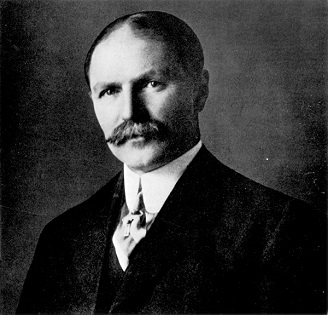 George Black
George Black

Commissioner from February 1, 1912 to April 1, 1918 (appointed at age 38)
George Black was born on April 10, 1873 in Woodstock, New Brunswick. He arrived in the Yukon during the Gold Rush and served three terms on the Yukon Council. During his term as Commissioner, he worked for better and more economical transportation and the stimulation of the mining industry. At the end of 1912, Black and C.A. Thomas, manager of the Yukon Gold Company, made the first trip by automobile from Dawson to Whitehorse. In 1913, an ordinance conferred on Black the authority of Mayor of Dawson. The first legislation regulating speed on highways in the territory was passed in 1913. During the First World War, Black recruited 200 men to form the Yukon Regiment of which he became the company’s Captain. He was the last Commissioner to live at the Commissioner’s Residence in Dawson, as it was closed in 1916, when he departed overseas. He was elected MP for Yukon from 1921 to 1935 and from 1940 to 1949. Black died on August 23, 1965 in Vancouver, British Columbia.
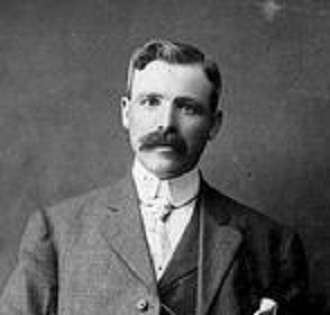
Arthur Wilson
Administrator from June 1, 1911-February 1, 1912 (appointed at age 43)
Arthur Wilson was born on Feb 10, 1868 in New Brunswick. He originally came to the Klondike with dreams of striking it rich on a claim on Ruby Creek. He sat on the Yukon Council in the early 1900s. He was the first old-time Yukoner to fill the position of Commissioner. His first task in office was to make smallpox vaccinations compulsory. Wilson died on September 2, 1948 in Pasadena, CA.
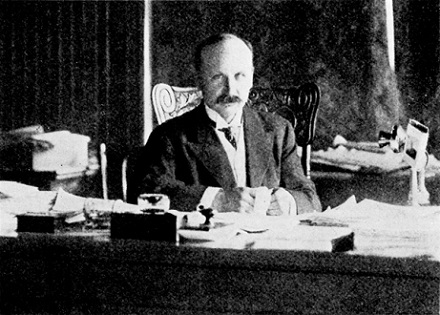 Alexander Henderson
Alexander Henderson

Commissioner from June 17, 1907 to June 1, 1911 (appointed at age 46)
Alexander L. Henderson was born on March 13, 1861 in Oshawa, Ontario. During his term, he worked for a moral reform and cleansing of the territory. The Council approved Henderson’s dancehall legislation in August of 1907 and the last dance hall, the Floradora, closed on January 18, 1908. He brought in the enforcement of the Lord’s Day Act in May 1908. He advocated railway access to other parts of Canada. He had plans to improve Dawson’s street and the road to the creeks or mine workings. He stopped further reductions in the territorial civil service. In 1908, the Yukon Act was amended to allow an Administrator to act for the Commissioner when the Commissioner was ill or absent. He presided over the first wholly elected Yukon Council. The Commissioner no longer sat with the Council, but he still had the final say on Yukon Affairs. In August 1909, Henderson and his wife welcomed Governor General Earl Grey during his visit to Dawson City. During his time in office, the Klondike Goldfields transitioned to capital-intensive mining operations. Henderson died on December 13, 1940 in Vancouver, British Columbia.
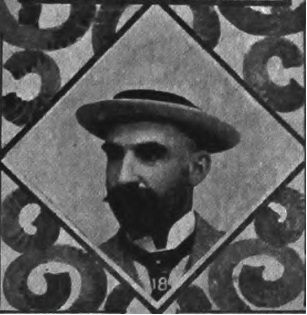 John Thomas Lithgow
John Thomas Lithgow

Acting Commissioner from December 31, 1906 to June 17, 1907 (appointed at age 50)
John T. Lithgow was born on January 25, 1856 in Halifax, Nova Scotia. He was an appointed member of the Yukon Council from 1904 to 1908. The miners of Grand Forks, near Dawson, started a petition to have Lithgow made permanent governor. He toured the Whitehorse Copper mines twice in his term. In 1910 he was appointed as the Canadian Trade Commissioner at Glasgow, Scotland. Lithgow died on March 14, 1928 in Madeira, Portugal.
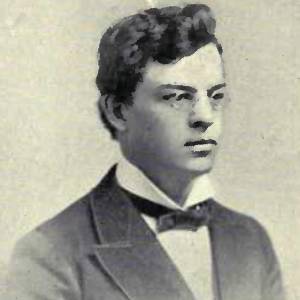 William Wallace Burns McInnes
William Wallace Burns McInnes

Commissioner from May 27, 1905 to December 31, 1906 (appointed at age 34)
William Wallace Burns McInnes was born on April 8, 1871 in Dresden, Ontario. He was 14 when he started at the University of Toronto and graduated at 18 in 1889. In March 1905, McInnes was soliciting Prime Minister Laurier for the Yukon commissionership, saying it was important that a westerner have the office. He received the appointment in May 1905. His appointment was popular in Yukon. He worked on getting a greater popular representation on the Council, on resource development and on the principle of civil servants not taking an active part in politics. On July 7, 1905, Commissioner McInnes addressed the Canadian Club of Dawson and promoted the idea of Yukon becoming a province. The 1906 Levee was one of the most lavish in the territory’s history. He was instrumental in bringing the Miners’ Lien bill into law in 1906. This bill provided guarantees to all employees working in the goldfields and is still used today. McInnes died on August 4, 1954 in Vancouver, British Columbia.
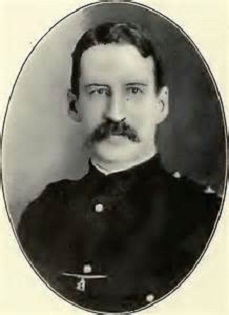 Zachary Taylor Wood
Zachary Taylor Wood

Acting Commissioner from October 29, 1904 to May 27, 1905 (appointed again at age 43)
Zachary Taylor Wood was born on November 11, 1860, in Annapolis, Maryland. He was the great-grandson of Zachary Taylor, the 12th President of the United States and son of Civil War Confederate Naval Officer John Taylor Wood. Mount Wood was named after him for the 125th anniversary of the RCMP. He was with the NWMP and RNWMP from 1885-1915. During his time in the territory, crime levels were kept at a minimum and the police were able to perform a variety of services for the government and the community such as collecting licence fees to the provision of relief supplies to those in distress. Wood was promoted to 2nd in command of the NWMP force and moved to Regina, Saskatchewan in 1910. Wood died on January 15, 1915 while on sick leave in Asheville, North Carolina.
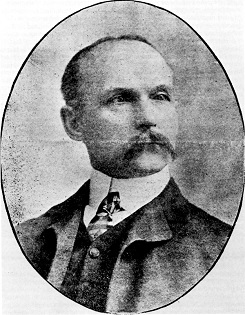 Frederick Tennyson Congdon
Frederick Tennyson Congdon

Commissioner from March 4, 1903 to October 27, 1904 (appointed at age 44)
Frederick Tennyson Congdon was born on November 16, 1858 in Annapolis, Nova Scotia. Congdon made a name for himself in the Territory as he listened to people he saw at the roadhouses on his way north to Dawson. He supported a wholly elected Yukon Council and more reforms to mining regulations that supported individual miners. Congdon reduced road expenditures and cut back on the ranks of the civil service. His tenure as Commissioner was characterized by corruption and controversy and his actions led to the disincorporation of the City of Dawson. Congdon and his wife were known for their sizzling parties and, in 1904, he began the tradition of the Commissioner’s New Year’s Levee at the Commissioner’s Residence in Dawson City. He resigned in 1904 to run in the federal election, which he lost to Alfred Thompson. He left the territory in October 1907, but he came back to win the Yukon federal election in February 1909. He lost his seat in 1911 to George Black. Congdon died on March 13, 1932 in Ottawa, Ontario.
 Zachary Taylor Wood
Zachary Taylor Wood

Acting Commissioner from August 15, 1902 to March 4, 1903 (appointed at age 41)
Zachary Taylor Wood was born on November 11, 1860, in Annapolis, Maryland. He was the great-grandson of Zachary Taylor, the 12th President of the United States and son of Civil War Confederate Naval Officer John Taylor Wood. Mount Wood was named after him for the 125th anniversary of the RCMP. He was with the NWMP and RNWMP from 1885-1915. During his time in the territory, crime levels were kept at a minimum and the police were able to perform a variety of services for the government and the community such as collecting licence fees to the provision of relief supplies to those in distress. Wood was promoted to 2nd in command of the NWMP force and moved to Regina, Saskatchewan in 1910. Wood died on January 15, 1915 while on sick leave in Asheville, North Carolina
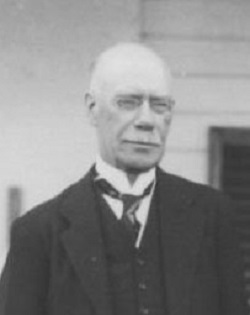 Henry William Newlands
Henry William Newlands

Acting Commissioner from February 8, 1902 to August 15, 1902 (appointed at age 39)
Henry William Newlands was on born March 19, 1862 in Dartmouth, Nova Scotia. He was the 4th Lieutenant Governor of Saskatchewan from 1921 to 1931. Newlands died on August 9, 1954 in St. Thomas, Ontario.
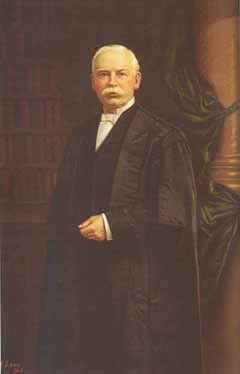 James Hamilton Ross
James Hamilton Ross

Commissioner from March 11, 1901 to October 16, 1902 (appointed at age 44)
James Hamilton Ross was born on May 12, 1856 in London, Ontario. During his term, not only did he lose his wife, youngest child and niece when their ship the Islander sank near Juneau, but he suffered a paralytic stroke. He was the first Commissioner to move into the newly built Commissioner’s Residence in Dawson City and he successfully lobbied Ottawa for a Yukon Member of Parliament in the Canadian House of Commons. Ross also suggested that judges be appointed for three-year terms to avoid leaving unfinished cases in limbo when judges left Yukon in the winter. Ross left office in 1902 to serve as Yukon’s First Member of Parliament. Ross died on December 14, 1932 in Victoria, British Columbia.
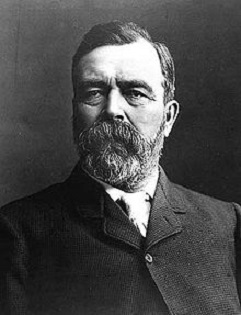 William Ogilvie
William Ogilvie

Commissioner from July 4, 1898 to March 11, 1901 (appointed at age 52)
William Ogilvie was born on April 7, 1846 in Ottawa, Ontario. Ogilvie was a land surveyor and surveyed the Yukon and Porcupine Rivers, Chilkoot Pass, and the border along Yukon and Alaska. In 1893, he advised Ottawa that the time had come to establish a formal Canadian presence in the region. He also surveyed Dawson City and named the town after his supervisor George Mercer Dawson. As Commissioner, Ogilvie would often work 16-hour days sorting out complaints and processing gold claims from frantic miners. Ogilvie acted as Mayor, City Engineer, Fire Chief of Dawson City, along with his federal and territorial duties. He created a drainage system in Dawson and took steps to reduce deforestation, encouraged road development, and he advocated for the establishment of a brickworks. He instituted medical inspections of the prostitutes on a monthly basis in order to control diseases. He resigned due to poor health. Ogilvie died on November 13, 1912 in Winnipeg, Manitoba.
